Q&A: As life imitates ‘Homeland’s’ disturbing art, co-creator Alex Gansa does some soul searching
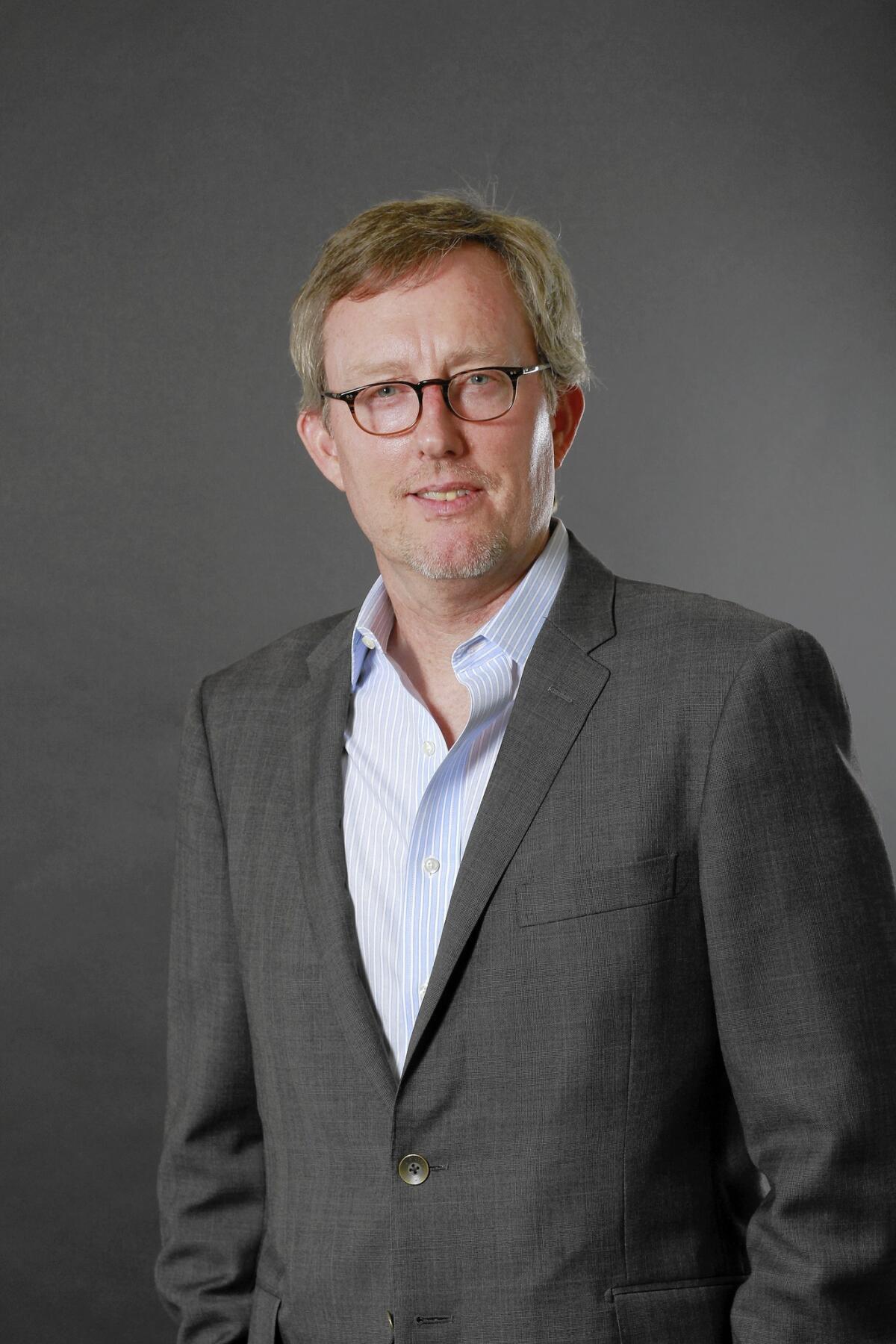
- Share via
The political thriller “Homeland” has always felt current, but this season the show’s co-creator and showrunner, Alex Gansa, offered up particularly prescient episodes that foreshadowed real news events.
The fifth season, which comes to a close Sunday night, has drawn attention for its story lines about Syria, ISIS and a terror plot against a major European city.
SIGN UP for the free Indie Focus movies newsletter >>
The last episode of the season wrapped in November, so Gansa had time to discuss the challenges of creating a show that can cut uncomfortably close to the bone.
“Homeland” has always had that ripped-from-the-headlines feel, but this season in particular felt eerily in sync with the news as it happened.
It’s nice to be congratulated about being prescient about these things. Honestly, if you looked at the world in January, a lot of these things were inevitable. There was only a matter of time before there was going to be another attack in Europe and possibly another one in the United States. So that doesn’t seem like we were so smart.
The rest of the stuff, I mean, again, these were the things that were being discussed in Washington. This whole idea of mass surveillance on American citizens and, frankly, on citizens on Europe. The whole Snowden controversy. All this was in the air at the time. And continues to be in the air. Whether we were predictive or ripped things from the headlines, this is what we tend to do each season is try to explore the ideas and issues being discussed at the highest levels and to try to pose questions about how America projects its power overseas.
Envelope Screening Series: ‘Homeland’

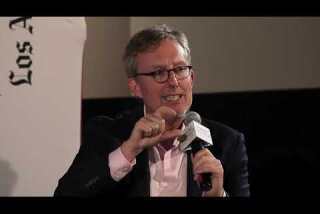
Homeland - Bringing Brody Back
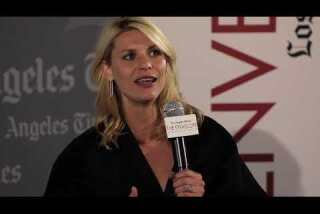
Homeland - Carrie and Aayan
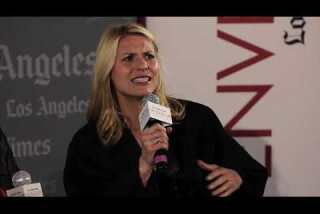
Homeland - Carrie As A Mother

Homeland - Isis
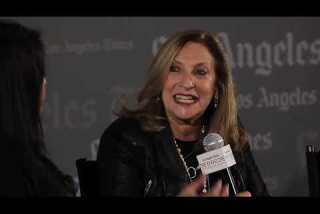
Homeland - DGA Award Episode
This year you pivoted the narrative to Berlin. Talk about what informed that decision.
Every season of “Homeland” starts with all the writers taking a field trip to Washington, D.C., and the three or four days that we spend there heavily influence our storytelling over the season. We’re hosted by John McGaffin, who is our consultant on the show and was the former deputy director of the Central Intelligence Agency. We entertain a parade of current and former intelligence officers, State Department people, White House staffers, journalists so we get a real front-row seat of what is being talked about in Washington.
And this year in January, you might imagine what was being talked about. Charlie Hebdo had just happened in Paris, ISIS had just burned a Jordanian pilot alive in a cave. Vladimir Putin was rattling the saber in the Ukraine. And Citizen Four was about to come about — the Laura Poitras movie about Edward Snowden. And he, Ed Snowden, was definitely part of the conversation. All that stuff was swirling around in conversation for those four days in Georgetown. And you can see how every one of those elements became part of the season this year.
But when you have an episode that airs after one of these real-life events — like the episode about a strike on a European city shortly after the Paris attack — is it unnerving when fiction skews too close to reality?
Those are all exactly the questions running around in my brain right now. I will tell you that I flew out to Berlin the very day after the Paris attack to film the big chemical attack on Hauptbahnhof train station in our “Homeland” fictional story. To say that there was soul searching going on in that flight is probably an understatement. It was a very bizarre and strange time to be shooting these scenes in the direct aftermath of this attack on Paris and with Berlin itself on edge.
I’m still struggling with all these questions and thoughts about what is “Homeland’s” place: Are we an entertainment show? What responsibility do we have? Are we putting the right message out into the world? I don’t have answers for any of those things except to say that as people watch episodes 11 and 12, we really tried very hard to dramatize a number of points of view on all this stuff. The Muslims [characters] on our show do not speak with one voice. They are all different voices with different agendas and different thoughts about things. Every action that is undertaken by the Central Intelligence Agency in the last few episodes is questioned and debated. And so we try not to be dogmatic or polemic about anything.
The season kicks off with Carrie leading a normal life. Were your writers excited about the prospect of putting her in “normal” scenarios?
We’ve taken her through so much sturm and drang over the last few years that we thought it would be nice to give her a little domestic bliss — which, by the way, was not something everybody wanted to do or everyone wanted to see on our staff. But it was nice because, especially what happened after Season 4, Carrie had become thoroughly disenchanted with the Central Intelligence Agency and with the work she had been asked to do. And it was nice to see her in a completely different environment doing something completely different from that work but using her old skill set to do so. We found her in a stable relationship with a stable, normal, appropriate man and doing work at a foundation, which essentially was doing the exact opposite kind of work that she was doing before as an intelligence officer. We did really pick her up this season in a completely different emotional and professional place.
It made me uncomfortable.
That’s interesting. Why?
Because it felt like she was stifling herself, or living a lie to achieve a false sense of normalcy.
I think it was weird for Claire [Danes] playing the role too because it’s like, Is this a character for whom any kind of domestic situation would ever make sense? One of the things that fascinated us in the story room was how much of her life could she share with a “normal person” and still be accepted by that person. She had done not only extraordinary things but also questionable things. And would a human rights lawyer like Jonas Hollander understand that, and would he continue to accept and love her after knowing all that? And it was kind of a big test for Carrie to open herself up to this guy, and that opening up began in Episode 3, and as you know it didn’t go so well.
Have you thought about what initially attracted Carrie to intelligence work?
That’s not something we’ve talked about or dramatized on the show, but it’s an interesting question. Clearly she was a brilliant mind in college, wherever she was. Clearly she came to the attention of Saul Berenson probably through a professor at some university who picked her out as somebody who was incredibly perceptive and acute about human behavior, somebody who had a razor-sharp mind and somebody who could thrive in the duplicitous role of intelligence work overseas. Somebody recognized these gifts and alerted Saul for this fact and she was recruited by him.
I think that’d be an interesting thing to explore, now that I think about it. I mean, you will in Episode 12, hear the story of how Quinn was recruited. It’s nice to know where these people came from.
Is there a storyline that turned out to be challenge to actually execute?
I think the whole move of Quinn to have fallen in with jihadis who are planning an attack in Berlin is one of those dramatic moves that’s going to be a little controversial. Some people are going to view it as coincidental. We really tried to set it up by having it be part of another story, which is Laura and the Düring foundation get a lot of these prisoners released from Plötzensee Prison. So that story does coincide with Quinn’s story. We tried to do that as seamlessly as possible. Also, some wonderful writing teacher of mine told me that if a coincidence gets somebody out of trouble, that’s bad. If a coincidence gets somebody into trouble, that’s a good plot point. So we sort of embraced that one.
Is there a show for you that incites this much discussion?
Oh, my God, are you kidding me? First of all, I have to apologize to everybody because these last four or five years, I have been under water. For example, I have not watched an episode of “Game of Thrones.” I have to look back to before that. At the very top of the heap for me is “The Wire.” I could talk to David Simon forever about “The Wire.” It took over my life for about two months there. I watched all five seasons straight through. I happen to love “Peaky Blinders.” And there was another British series that I thought was astonishingly well done — and notice that I watch the ones with five or six episodes — but I really liked “Happy Valley.” My wife has not stopped raving about “The Americans.” I have not had a chance to watch it, but I am dying to.
Do you ever wonder what Dana Brody is up to?
You know, I don’t think about Dana, but I think about Morgan Saylor a lot. I wonder what she’s up to because she’s a great actress. I’m still interested in the Brody family, though. I know they caused grimaces across the Internet.
I feel like Dana could be a Carrie in the making.
I totally do too. What if she became a CIA officer, right? That would be so interesting.
Yeah, and she has a reason to want to seek answers.
Precisely. I hadn’t considered that. That’s actually pretty fascinating. Season 8, here we come.
The finale airs tonight. When it’s over, what do you expect the tweet that viewers send out will say?
Don’t.
Don’t?
I’m just going to leave it hanging there.
More to Read
The complete guide to home viewing
Get Screen Gab for everything about the TV shows and streaming movies everyone’s talking about.
You may occasionally receive promotional content from the Los Angeles Times.







